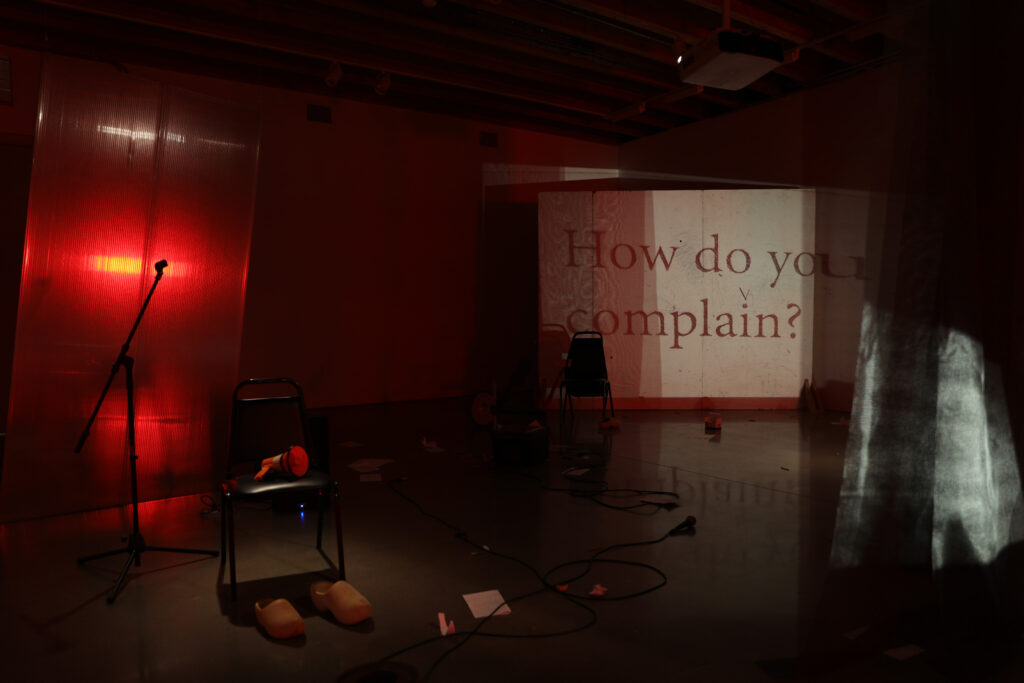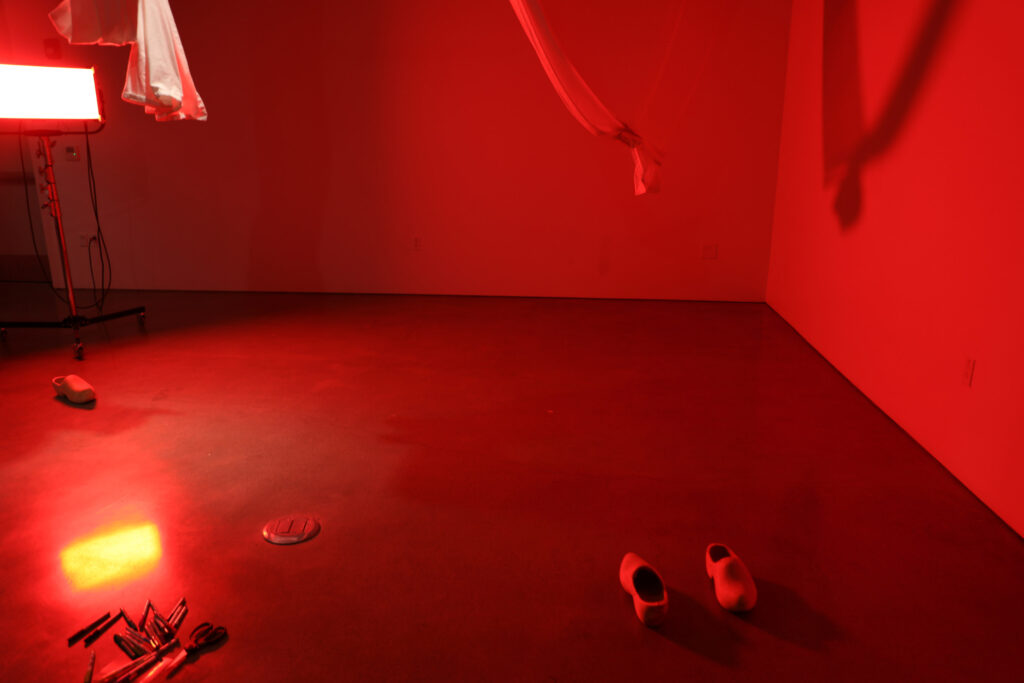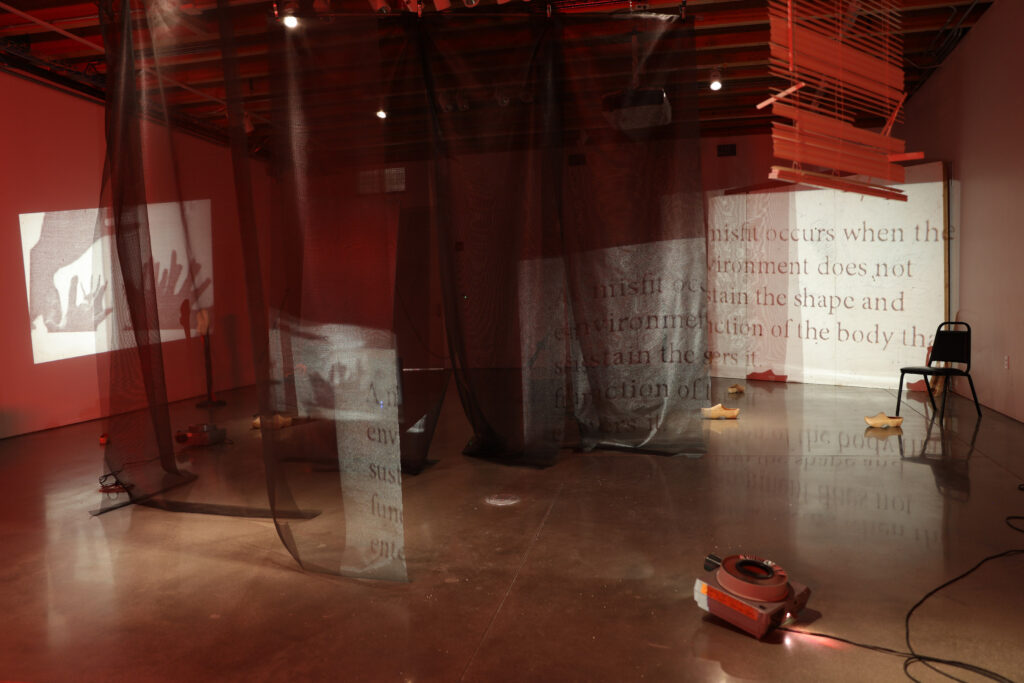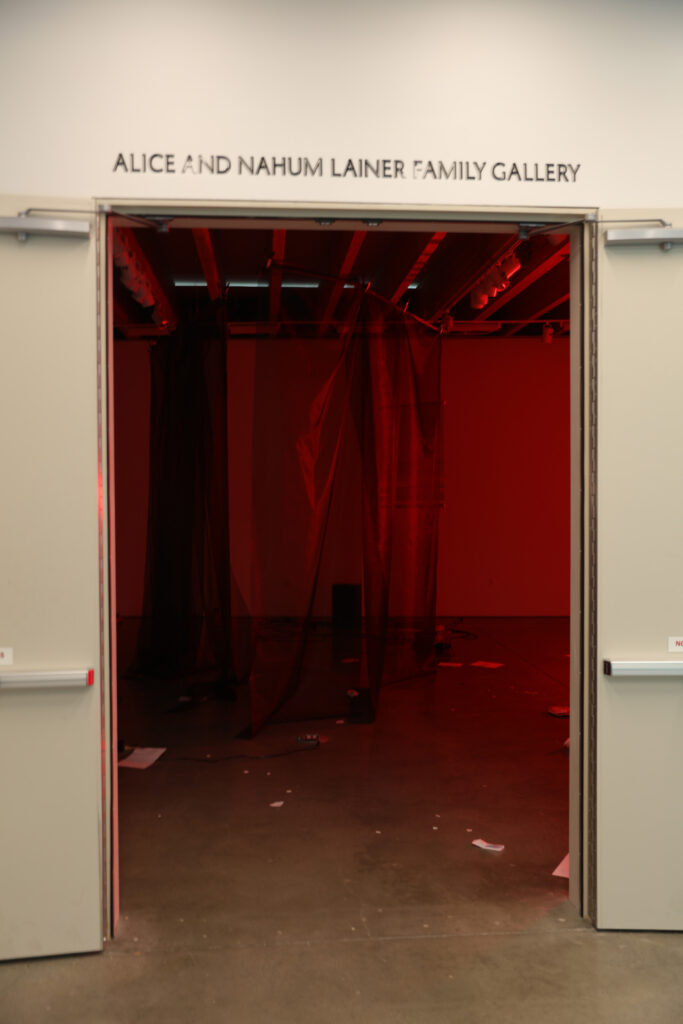
Nathaniel went up to strangers with a microphone asking if they would be willing to share their most recent complaint. Olivia sat down next to friends to have intimate private conversations, hopefully a respite from being ‘on’ and performing, having worked a full day already.
Meanwhile,
a clacking metronome and old slide projectors blended in the low light
with six other workshop participants
kicking wood clogs across the room,
raking their hands down blinds,
messing up curtains,
rattling plastic wall dividers,
abusing chairs, walls and doors for their acoustic properties,
creating high pitched feedback,
setting off alarms from a megaphone,
engaged in an intermittent call and response of rhythmic and controlled chaos that refused to
pickup tempo or cut it out.
“I don’t know what went right,” Whitfield remarked afterward, “So what can go wrong?”
‘Complaint!’ The workshop/performance played out various forms of dull agitation, which came through as playful ennui and defiant, a slow moving storm of collective disruptive energy. At times a poetic re-framing of passive aggressiveness within an institutional space it felt like an invitation to practice slowing down and ‘not’ perform, like a woman who’s been told to smile by a man because it’d make her more attractive.
The cathartic gestures were not as direct as that epic hip-hop fax-machine-smashing scene in Mike Judge’s ‘Office Space’, nor as direct as the trickster energy of Natalie Palamides consensually cupping crotches in ‘Nate – A One Man Show’, but I found it equally thrilling because sometimes you want to hold onto that moment of messing with things and seeing where it goes. In ‘Complaint!’ the slightest actions ranged between uncanny, alienated, and observant. The abused props were stand ins for a contemporary art work that gets treated with more respect and reverence than the workers themselves. (The powerful light rentals weren’t touched though, gotta get that deposit back!)

After sharing my secret performance piece ‘Everything I’ve Stolen From Work’ with Olivia, she shared with me her own subversive acts. Olivia used to work as a guard at The ICA Boston, and she would very gently kick a sculpture on her way out after each shift as a reaction to the ways the museum danced around paying their staff appropriately. Today, Olivia has been an integral part of MOCA’s successful union organizing, and in this exhibition venue she’s co-facilitated a kind of dance of not dancing. When I realized how much banging things around was the bulk of the performance, I couldn’t help but chuckle to myself how every thwomp was like an homage to those first angsty moments, before she found an outlet in activism. I had this smile of recognition. Nice one, comrade.
The antagonistic theme settled nicely into the context of an MFA adjacent space where often relentless individualized productivity and wringing out one’s life experience is the pre-requisite for being taken seriously as a real artist.
To give some of a local art performance context that this work comes out of, I thought of gestures like EJ Hill forcefully keeping the gallery door closed to their own MFA thesis exhibition, Sara Roberts bringing together public ‘clumps’ of strangers and co-organizing The Readers Chorus that explores textures of written text but never sings, and Emily Mast, who ironically, described to me how much they made sure to tell her volunteer participants that they have the option to opt out at any time which kindof felt like a red flag?
Both Leiter and Whitfield also collaborated as educators for a lecture by the same name in a World Arts & Culture class. They proudly explained that the students staged a protest during the class (about how the less expensive on-campus housing lacks heating) and how some students rapped on top of protest songs, making them their own, which echoed my own experience working with enjoyably creative disgruntled UCLA students. I also appreciate that the work was not too polished. In performance—and educators talk about this too—one can over-prepare, and the work can be too good, too tidy, perhaps too concerned about not failing than opening unstructured moments for meeting people where they are. But it’s also a matter of self-compassion, of trusting your instincts and acknowledging that there will always be something outside of your control, and this acknowledging helps to limit anxiety. Which reminds me of another local reference, the Best Friends Learning Gang, where I learned that internally, one of their unwritten rules is to only give themselves a day to prepare the entire workshop, including knowing which materials to buy, and organizing the diversity of ways that the participants will be able to be engaged (because during the workshop they’re all meant to be learning together with the participants anyway).
I have been looking out for artworks, outlets and expressions that deal in particular with the concept of ‘Solidarity’ as well as playful forms of ‘Refusal'[1]. I’m also learning to try to honor my own anger and trust myself that I can hold these human feelings safely since when growing up, I couldn’t trust that my older brother’s anger wouldn’t turn quickly to violence as followed by my parent’s neglect. It’s said that one of your first forms of agency is with your presence, and even if forced to be somewhere, you can be present on your terms. It may have formed the basis of finding my kinship family, but as a coping mechanism, avoiding anger has subconscious unintended consequences, particularly in how the vigilance and blame turns inward.One of the ways I convey disdain and retain self-respect is also by not playing along. There’s another community I’m on the look out for and it’s those who identify with having something called ‘Pathological Demand Avoidance’ but it’s been more appropriately restated as PDA: A ‘Persistent Demand for Autonomy’. Besides having a kind of phobia of curators and trying to sort out the fear from self-sabotage, I also find myself unable to simply ‘play along’ even with my own goals, and it’s been difficult to simply embrace it without judgement, and so I am still working on fully understanding it. Intuitively it makes sense to me that if I can’t fully handle these feelings on my own, then the next best thing is to find a supportive group that shares this affliction that allow me to be where I’m at, a needed break from nice friends that may still only be able to offer condolences, pity, unsolicited advice, subtle self blame, or temporary diversions.
If I think of the ‘Complainer’ within an ‘Internal Family Systems’ framework (a therapy modality I explored with a somatic therapist), where every ‘negative’ emotion has good intentions but often lacks foresight, it is still a part of us that needs to be cared for rather than dismissed. The complainer in me conveys distress, animosity, a lack of agency, and worry that something’s not right. Although it is prone to catastrophizing, it actually hopes to lower my expectations to be pleasantly surprised, to phone in an energy-depleted call for help.

An accompanying text included some excerpts from Sara Ahmed’s book ‘Complaint’, which I only later realized the performance was either re-creating/translating/digesting. I love to bring up her reclaiming the identity of being a ‘Killjoy’, which Could be understood as pride in setting personal boundaries and coming across as unpleasant rather than having resentment fester in one’s own body and constantly accommodating the powers that be.
Slides and a handmade book with transparent film echo similar sentiments projected across and through the space but with a cold removed feeling that reminded me of bureaucratic jargon or academic rhetoric causing dissociation:
“Structures are about what is repeated”
“Misfit occurs when the environment does not sustain the shape and function of the body that enters it”
The fragments of these texts feel like they just need a little bit more context to be content. Words become forms and textures that, like the furniture, can be dragged across surfaces or thrown across the room. It’s in this deliberately annoying behavior that the performance feels like it’s finding its voice: an aesthetic of anti-work, anti-capitalism.
And who can complain? How, and to whom? And toward what ends?
Complaints can come off like the domain of white ‘Karens’, who weaponize it when calling for backup, or the fragile egos of people who fail to realize they’re neither a good worker nor a good manager, or even just the person who finds themself as the loser in a competition they never signed up for. I also think about the Black codes that are a holdover from the Reconstruction era, in which white people in power created loitering laws so that a group of three or more Black men wasn’t just cause for alarm but the slippery slope to fines, destitution, and the enforcement of their labor by any means necessary. The injustice chills us all when those who deserve to have the time and space to find others to commiserate and grieve with are broken up with something as small and ‘innocuous’ as a complaint.
I thought about ‘COMPLAINT!’ as a kind of performance by art workers for art workers, even though I’ve developed a kind of skepticism around workshops that have a public-facing component, as I think it’s a clever way to not have to pay performers.

In a workplace setting, registering a complaint is the route of a formal process towards further investigation, so you’re meant to drop being affected by micro aggressions in the meantime. But in defense of actually following through with making a complaint, informally it makes visible the offloading of individualized baggage; opening up the floor. It may encourage shy people to shift away from emotional labor in private towards engaged participation, and some people unlock an eloquence of spite, finding purpose in shared struggle.
In a workshop, performatized, complaint emerges as a coordinated effort to doing unsettling things intentionally, practicing rapport, making waves, batting at the flimsy walls that divide us, stretching time being unproductive, a definition of play. It makes staring down insurmountably large systemic problems as easy as not caring enough, or lacking reverence around expertise, hierarchy, or the work ethic. Is it strange to have such hope in hopelessness?
It feels refreshing in comparison to respectability politics which is a performance itself: a surface oriented assimilation of model minority myths, ‘tone policing’, and non-binding reforms which gaslight and serve the imbalance of power. I think people confuse identity politics as a culprit of collective complaining when we can’t even distinguish inaction (output failure) between expressions of being overwhelmed, complicity, autistic burnout, or needing healthy boundaries. [2] Not everyone agrees that silence means assent, but it’s useful to decide with one’s community if it does. Our interactions with each other are improved with clarity and a diversity of bodies, all of which improves access; access to solidarity (and freedom) as a way of life.
We’ve got terms about being in relation like ‘interpersonal’, ‘parasocial’, ‘Goffmanian allusion to the performance of everyday life’, and ‘neurodivergent masking’, but does someone know the word for the social contract when you commit as a viewer to watch an ‘experimental performance’ unfold? (Legendary local experimental musician, Joe Baiza once told me that you can get away with anything for 20 minutes. Any more than that and you start to lose the audience.)
This performance swelled for more than half an hour, and when it ended, I realized I was alone in the space, almost waiting for my turn.
Why was it so easy to linger, to let ‘nothing really happening’ keep happening? The closest term I can think of is somewhere between
‘the social contract’
&
‘a willing suspension of belief’,
except instead of following speculative fiction / following a narrative, it’s like a suspension of needing to even have a narrative, as if it represents suspending that individual identity as a person that defines themselves by their work or job; perhaps giving a benefit of the doubt that we’re on the same side of this uncomfortable complaint. This work is important that it takes its time and isn’t beholden to ‘doing good’ or ‘looking good’ [3] so explicitly because like the Instagram account ‘The Nap Ministry’ and Tricia Hersey preaches, the sustainability of our own mental and spiritual well being is not optional. Relatedly, on the radio, on my way (late) to the performance, I overheard an interview with a first-time teacher, expressing their dismay at their profession being blamed by random members of the public for not fixing every form of inequality that existed well before the pandemic created new rules. The interview concluded with them admitting that they’ll be taking some time away [4], and it reminds me how so many of my peers, myself included, left classroom teaching—in my case, leaving the entire W-2 workforce. Now I’m nearing over 800 days since I was employed even for part-time work, which you’d think would make me a full-time artist, but I didn’t want that either.
I think about developing my futurist job of being an ‘Un-Work Consultant’, in which I’ve already convinced a well-known curator to write less letters of recommendation, and how my participation in various groups shows a kind of dedication to being my fullest self while blending into something poly-vocal and bigger than myself. I feel like all I’ve been doing is trying to find signs of life beyond the personal pursuit of a career akin to chasing the American Dream (in Los Angeles. It follows my thesis that my ADHD/Autism isn’t an unfortunate individual dilemma nor an exciting perspective that is prone to abuse and extraction, but it can bring people together who consistently fail to do capitalism. This time, maybe we could do that together? Trying out this ‘Un-Work Consulting’ was inspired by reading Kathi Weeks’ book The Problem with Work: Feminism, Marxism, Antiwork Politics, and Postwork Imaginaries with the Community Reading Group. I’ve specifically been trying to implement it as part of ‘learning to love our traumas’ within the artist collective the Revolution School. It also feels crucially informed by my participation in SolidarityClub.org, where we’ve been talking about the why/how/where of organizing well before this pandemic, and how organizing work is truly FOR everyone especially when people are feeling the most politically impotent, pessimistic, and disoriented.
The performance reminds me of the ease and accountability of collaboration and interdependence, which is such a joy for me, especially when compared to the slog of putting on solo shows or a solo career, where much of my stress comes from trying not to ask the same friends for too many favors, that flattening fear of failure, the imposter phenomenon, the dread of maintaining consistency, or the grief of falling short of my own very high standards. I may not be able to live without being filled with contradiction but like I’ve heard about the upcoming Gen Z, I do not compromise my values, especially when there is more serendipity and things that do ‘work out’, because like Nathaniel and Olivia, I’m less invested in what I can do alone, than what trouble I can stir up with others.
Further context notes:
[1] I’ve been enjoying reading “Trickster Makes This World: Mischief, Myth, and Art” by Lewis Hyde and “Tell Them I Said No” by Martin Herbert and of course there’s Lee Lozano but… does anyone else feel like it’s kindof icky that Hauser & Wirth has their personal journals?
[2] Elite Capture: How the Powerful Took Over Identity Politics (And Everything Else) by Olúfẹ́mi O. Táíwò
[3] https://www.kcrw.com/news/shows/greater-la/in-person-school-mark-rozzo-book/lausd-disconnection
[4] Later, when writing this review I tried to locate the project on either of their Instagram pages but couldn’t find it. I like that this work is even defying commodification including on social media as the ultimate form of FOMO. I look forward to the revolution where we all unplug and walk away from devices and online platforms that we once thought we needed to invest our time and energy into.
[My video documentation]